- Home
- Fredric Brown
Martians, Go Home Page 4
Martians, Go Home Read online
Page 4
Dorothy’s voice sounded worried. “Darling, how do we know he can’t see in the dark. Cats can, and owls.”
Bill hesitated, but only a moment. “Damn it, honey, even if he can see in the dark he can’t see through blankets. We can even undress under the covers.”
He went over to the window and slammed it down, then pulled the shade, taking angry pleasure in reaching right through the Martian to perform both operations. He pulled down the other shade and then turned off the light. Groped his way to the bed.
And, although their feeling of a need for silence inhibited there in some ways, and they didn’t feel it right every to whisper to one another, it was a wedding night after all.
They’d have been less happy about it though (and were less happy about it the next day) had they known, as everyone found out within a day or two, that not only could Martians see in the dark, but they cold see through blankets. Or even walls. Some kind of X-ray vision or, more likely, some special ability like kwimming, enabled them to see right through solid objects. And very good vision it was too, for they could read the fine print on folded documents in closed drawers or in locked safes. They could read letters or even books without opening them.
As soon as this was learned, people knew that they could never again be sure of privacy as long as the Marbans stayed. Even if there wasn’t a Martian in the room with them, there might be one in the next room or outside the building watching them through the wall.
But that is getting ahead of ourselves, because few people learned or guessed it the first night. (Luke Deevereaux, for one, should have guessed it, because his Martian had read Rosalind’s letters in a closed suitcase—but there at that moment Luke didn’t yet know that the Martian couldn’t have simply opened the suitcase and handled the letter. And after Luke did have those two facts to couple together he was in no shape to do any effective coupling.) And that first night, before most people knew, the Martians must have seen plenty. Especially the thousands of them that happened to kwim into already darkened rooms and found themselves interested enough in what was going on there to keep their mouths shut for a while.
5.
America’s second most popular indoor sport took an even worse beating that night, and became impossible then and thereafter.
Take what happened to the gang that played poker every Thursday night at George Keller’s place on the beach a few miles north of Laguna, California. George was a bachelor and retired; he lived there the year round. The others all lived in Laguna, held jobs or owned shops.
That particular Thursday evening there were six of them, counting George. Just the right number for a good game, and they played a good game, all of them, with the stakes just high enough to make it exciting but not high enough to hurt the losers seriously. Dealer’s choice, but dealers chose only between draw poker and five-card stead, never a wild game. With all of them poker was more nearly a religion than it was a vice. Thursday nights from around eight until around one—or sometimes even two—in the morning were the highlights in their lives, the shining hours to which they looked forward throughout the duller days and evenings of the week. You couldn’t call them fanatics, perhaps, but you could call them dedicated.
By a few minutes after eight they were comfortable in shirt sleeves and with neckties loosened or taken off, sitting around the big table in the living room ready to start play as soon as George had finished shuffling the new deck he had just broken out. They’d all bought chips and they all had tinkling glasses or opened beer cans in front of them. (They always drank, but always moderately, never enough to spoil their judgment or the game.)
George finished his shuffle and dealt the cards around face up to see who’d catch a jack for the first deal; it went to Gerry Dix, head teller at the Laguna bank.
Dix dealt and won the first hand himself on three tens. It was a small pot, though; only George had been able to stay and draw cards with him. And George hadn’t even been able to call; he’d drawn to a pair of nines and hadn’t improved them.
Next man around, Bob Trimble, proprietor of the local stationery store, gathered in the cards for next deal. “Ante up, boys,” be said. “This one’ll be better. Everybody gets good cards.”
Across the room the radio played soft music. George Keller liked background music and knew which stations to get it on at any given hour of a Thursday evening.
Trimble dealt. George picked up his hand and saw two small pairs, sevens and treys. Openers, but a bit weak to open on right under the gun; someone would probably raise him. If someone else opened he could stay and draw a card. “By me,” he said.
Two more passed and then Wainright—Harry Wainright, manager of a small department store in South Laguna—opened the pot for a red chip. Dix and Trimble both stayed, without raising, and George did the same. The men who’d passed between George and Wainright passed again. That left four of them in the game and gave George an inexpensive draw to his two small pairs; if he made a full house out of them he’d probably have the winning hand.
Trimble picked up the deck again. “Cards, George?”
“Just a second,” George said suddenly. He’d turned his head and was listening to the radio. It wasn’t playing music now and, in retrospect, he realized that it hadn’t been for the past minute or two. Somebody was yammering, and much too excitedly for it to be a commercial; the voice sounded actually hysterical. Besides, it was around a quarter after eight and if he had the program he thought he had, it was the Starlight Hour, which was interrupted only once, at the half hour, by a commercial break.
Could this possibly by an emergency announcement—a declaration of war, warning of an impending air attack, or something of the sort?
“Just a second, Bob,” he said to Trimble, putting down his hand and getting up out of his chair. He went over to the radio and turned up the volume.
“…little green men, dozens of them, all ever the studio and the station. They say they’re Martians. They’re being reported from all over. But don’t get excited—they can’t hurt you. Perfectly harmless because they’re impal—im—you can’t touch them; your hand or anything you throw at them goes right through like they weren’t there, and they can’t touch you for the same reason. So don’t—”
There was more.
All six of them were listening now. Then Gerry Dix said, “What the hell, George? You holding up the game just to listen to a science-fiction program?”
George said, “But is it? I had the Goddam Starlight Hour tuned in there. Music.”
“That’s right,” Walt Grainger said. “A minute or two ago they were playing a Strauss waltz. Vienna Woods, I think.”
“Try a different station, George,” Trimble suggested. Just then, before George could reach out for the dial, the radio went suddenly dead.
“Damn,” George said, fiddling with the dials. “A tube must have just conked out. Can’t even get a hum out of it now.”
Wainright said, “Maybe the Martians did it. Come on back to the game, George, before my cards get cold. They’re hot enough right now to take this little hand.”
George hesitated, then looked toward Walt Grainger. All five of the men had come out from Laguna in one car, Grainger’s.
“Walt,” George said, “you got a radio in your car?”
“No.”
George said, “Damn it. And no telephone because the lousy phone company won’t run poles this far out from—Oh, hell, let’s forget it.”
“If you’re really worried, George,” Walt said, “we can take a quick run into town. Either you and me and let the others keep playing, or all six of us can go, and be back here in less than an hour. It won’t lose us too much time; we can play a little later to make up for it.”
“Unless we run into a spaceshipload of Martians on the way,” Gerry Dix said.
“Nuts,” Wainright said, “George, what happened is your radio jumped stations somehow. It was going on the blink anyway or it wouldn’t be dead now.”
“
I’ll go along with that,” Dix said. “And what the hell, if there are Martians around let ’em come out here if they want to see us. This is our poker night, Gentlemen. Let’s play cards, and let the chips fall where they may.”
George Keller sighed. “Okay,” he said.
He walked back to the table and sat down, picked up his hand and looked at it to remind himself what it had been. Oh, yes, sevens and treys. And it was his turn to draw.
“Cards?” Trimble asked, picking up the deck again. “One for me,” George said, discarding his fifth card. But Trimble never dealt it.
Suddenly, across the table, Walt Grainger said, “Jesus Christ!” in such a tone of voice that they all froze for a second; then they stared at him and quickly turned to see what he was staring at.
There were two Martians. One was sitting on top of a floor lamp; the other was standing atop the radio cabinet. George Keller, the host, was the one who recovered first, probably because he was the one of them who’d come nearest to giving credence to the report they’d heard so briefly on the radio.
“H-hello,” he said, a bit weakly.
“Hi, Mack,” said the Martian on the lamp. “Listen, you better throw that hand of yours away after the draw.”
“Huh?”
“I’m telling you, Mack. Sevens and threes you got there, and you’re going to have a full house because the top card on the deck’s a seven.”
The other Martian said, “That’s straight, Mack. And you’d lose your shirt on that full because this slob—” He pointed to Harry Wainright, who had opened the pot.—opened on three jacks and the fourth jack is the second card from the top of the deck. He’ll have four of them.”
“Just play the hand out and see,” said the first Martian. Harry Wainright stood up and slammed his cards down face up on the table, three Jacks among them. He reached over and took the deck from Trimble, faced the top two cards. They were a seven and a jack.
As stated.
“Did you think we were kidding you, Mack?” asked the first Martian.
“Why, you lousy—” The muscles of Wainright’s shoulders bunched under his shirt as he started for the nearest Martian.
“Don’t!” George Keller said. “Harry, remember the radio. You can’t throw them out if you can’t touch them.”
“That’s right, Mack,” said the Martian. “You’ll just make a worse ass out of yourself than you are already.”
The other Martian said, “Why don’t you get back to the game? We’ll help all of you, every hand.”
Trimble stood up. “You take that one, Harry,” he said grimly. “I’ll take this one. If the radio was right we can’t throw them out, but damned if it’ll hurt to try.”
It didn’t hurt to try. But it didn’t help either.
6.
Human casualties in all countries that night—or, in the opposite hemisphere, that day—were highest among the military.
At all military installations sentries used their guns. Some challenged and then fired; most of them just fired, and kept on firing until their guns were empty. The Martians jeered and egged them on.
Soldiers who didn’t have guns at hand ran to get them. Some got grenades. Officers used their side arms.
All with the result that carnage was terrific, among the soldiers. The Martians got a big bang out of it.
And the greatest mental torture was suffered by the officers in charge of really top secret military installations. Because quickly or slowly, according to how smart they were, they realized that there no longer were any secrets, top or otherwise. Not from the Martians. Not, since the Martians loved to tattle, from anyone else.
Not that, except for the sake of causing trouble, they had any interest in military matters per se. In fact, they were not in the slightest degree impressed by their examination of secret armed-rocket launching sites, secret A- and H-bomb stock piles, secret files and secret plans.
“Peanut stuff, Mack,” one of them sitting on the desk of a two-star general in charge of Base Able (up to then our really top military secret) told the general. “Peanut stuff. You couldn’t lick a tribe of Eskimos with everything you got if the Eskimos knew how to vahr. And we might teach them to, just for the hell of it.”
“What the hell is vahring?” roared the general.
“None of your Goddam business, Mack.” The Martian turned to one of the other Martians in the room; there were four of them altogether. “Hey,” he said, “let’s kwim over and take a look at what the Russkies got. And compare notes with them.”
He and the other Martian vanished.
“Listen to this,” one of the two remaining Martians said to the other. “This is a real boff.” And he started reading aloud from a supersecret document in a locked safe in the corner.
The other Martian laughed scornfully.
The general laughed too, although not scornfully. He kept on laughing until two of his aides led him away quietly.
The Pentagon was a madhouse, and so was the Kremlin, although neither building, it must be said, drew more than its proportionate share of Martians, either at the time of their arrival or at any time thereafter.
The Martians were as impartial as they were ubiquitous. No one place or type of place interested them more than did another. White House or cathouse, it didn’t matter.
They were no more or less interested in big things like, say, the installations in New Mexico where the space station was being worked on than they were in the details of the sex life of the humblest coolie in Shanghai. They sneered equally at both.
And everywhere and in every way they invaded privacy. Privacy, did I say? There no longer was such a thing.
And it was obvious, even that first night, that for as long as they stayed there would be no more privacy, no more secrecy, either in the lives of individuals or in the machinations of nations.
Everything concerning us, individually or collectively, interested them—and amused and disgusted them.
Obviously the proper study of Martiankind was man. Animals, as such, did not interest them, although they did not hesitate to frighten or tease animals whenever such action would have the indirect effect of annoying or injuring human beings.
Horses, in particular, were afraid of them and horseback riding, either for sport or as a means of transportation, became so dangerous as to be impossible.
Only a foolhardy person, while the Martians were with us, dared try to milk a cow that was not firmly secured with its feet tied down and its head in a stanchion.
Dogs became frenetic; many bit their masters and had to be put away.
Only cats, each after an initial experience or two, became used to them and took them calmly and with aplomb. But then cats have always been different.
PART TWO
Landscape with Martians
1.
The Martians stayed, and no one knew or could guess how long they might stay. For all we knew, they might be here permanently. It was none of our business.
And little if anything was learned about them beyond what was obvious within a day or two after their arrival. Physically, they were pretty much alike. Although not identical, they averaged considerably less physical variation from one of them to another than human beings, of the same race and sex, average.
The only important difference among them was a difference in size; the largest among them was as tall as three feet and the smallest as short as two feet, three inches.
There were several schools of thought, among human beings, as to the explanation of this difference in height among them. Some people thought that they were all adult males—which, judging from their faces, they appeared to me—and that variation in height among them was as natural among them as is variation in height among human beings.
Other people thought that the difference in height indicated a difference in age; that probably they were all adult males but that, with them, growth did not cease at adulthood and that the short ones were relatively young and the tall ones relatively o
ld.
Still other people thought that the tall ones were probably males and the shorter ones females, and that seen differences between them, whatever they might be, didn’t show except in height when they had their clothes on. And since no one ever saw a Martian with his clothes off, this possibility, like the others, could be neither proved nor disproved.
And then there was the theory that all Martians were alike sexually, being either bisexual or having no sex at all, as we understand sex, and that possibly they reproduced by parthenogenesis or some means we couldn’t even guess at. For all we knew they grew on trees like coconuts and dropped off when they were ripe, already adult and intelligent, ready to face their world, or to face and sneer at ours. In that case, the smallest among them could have been babies, as it were, just off the tree but fully as hateful as the bigger and older ones. If the smallest among them weren’t infants, then we never saw a Martian infant.
We never learned what they ate or drank or even whether they did eat or drunk. They couldn’t have eaten Earth food, of course; they couldn’t even pick it up or handle it, for the same reason that we couldn’t handle them. Most people thought that, since their kwimming seemed to be an instantaneous process, a Martian would simply kwim to Mars and back again any time he felt the need for food or drink. Or for sleep, if Martians slept, since no one had ever seen a Martian sleeping on Earth.
We knew amazingly little about them.
We didn’t know for sure that they were really here in person. Many people, and especially scientists, insisted that a life form that is noncorporeal, without solidity, cannot possibly mist. And that therefore what we saw weren’t the Martians themselves but projections of them, that the Martians had bodies as solid as ours and left their bodies back on Mars, possibly in a trance state, that kwimming was simply the ability to project an astral body that was visible but not corporeal.
If true, that theory explained a lot, but that there was one thing it didn’t explain even its most ardent proponent had to admit. How could a noncorporeal projection talk? Sound is the physical movement or vibration of air or other molecules so how could a mere projection that wasn’t really there create a sound?

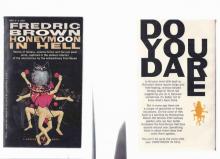 Hall of Mirrors
Hall of Mirrors Honeymoon in Hell
Honeymoon in Hell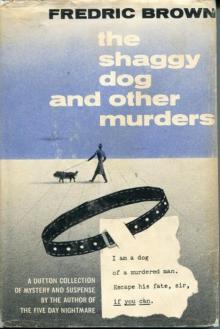 The Shaggy Dog and Other Murders
The Shaggy Dog and Other Murders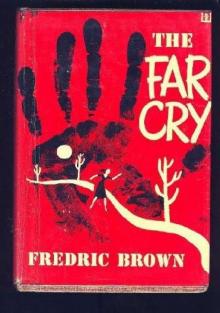 The Far Cry
The Far Cry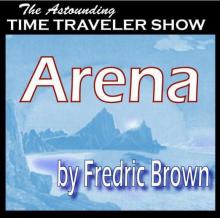 Arena
Arena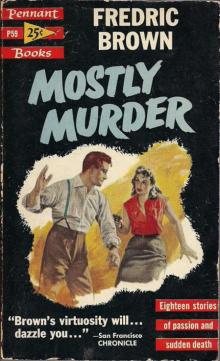 Mostly Murder
Mostly Murder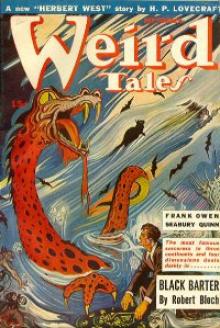 The Geezenstacks
The Geezenstacks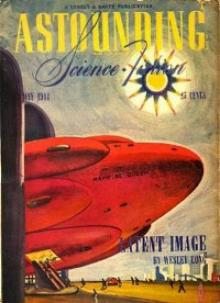 The Yehudi Principle
The Yehudi Principle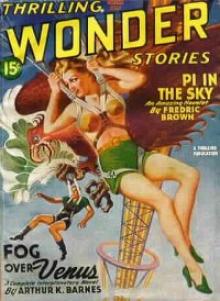 Pi in the Sky
Pi in the Sky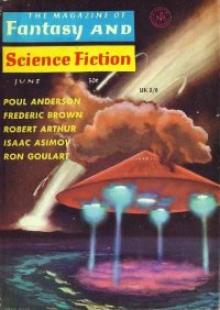 Eine Kleine Nachtmusik
Eine Kleine Nachtmusik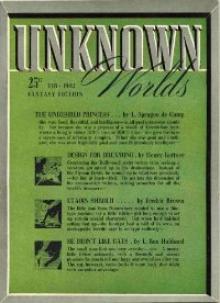 Etaoin Shrdlu
Etaoin Shrdlu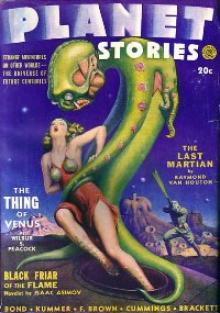 The Star Mouse
The Star Mouse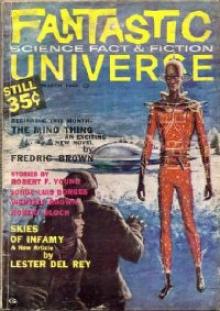 The Mind Thing
The Mind Thing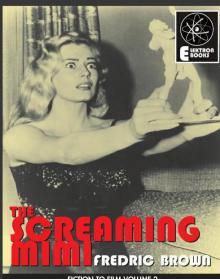 The Screaming Mimi
The Screaming Mimi The Fabulous Clipjoint
The Fabulous Clipjoint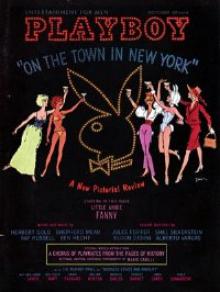 Puppet Show
Puppet Show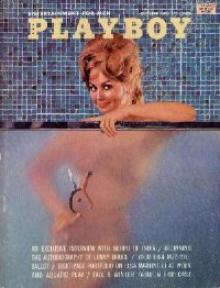 It Didn't Happen
It Didn't Happen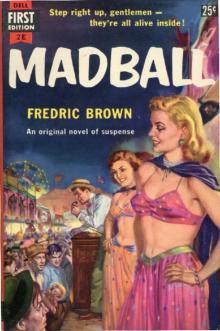 Madball
Madball Happy Ending
Happy Ending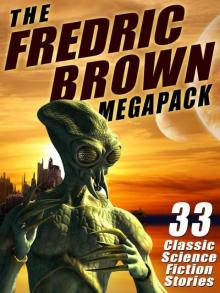 The Fredric Brown Megapack: 33 Classic Science Fiction Stories
The Fredric Brown Megapack: 33 Classic Science Fiction Stories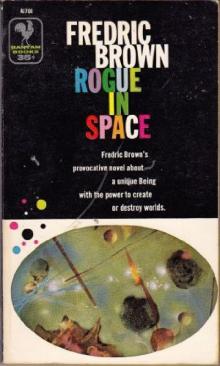 Rogue in Space
Rogue in Space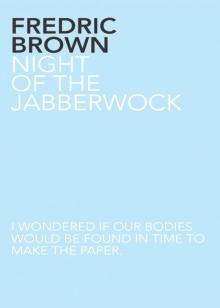 Night of the Jabberwock
Night of the Jabberwock The Dead Ringer
The Dead Ringer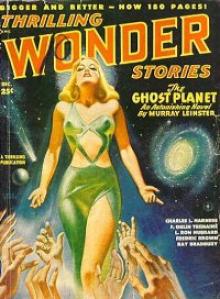 Knock
Knock We All Killed Grandma
We All Killed Grandma Space On My Hands
Space On My Hands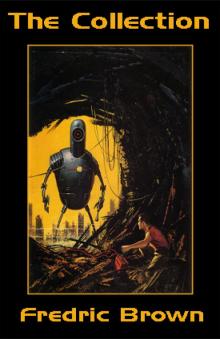 The Collection
The Collection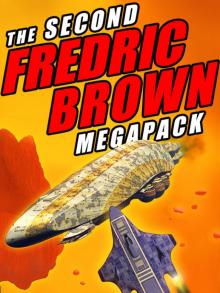 The Second Fredric Brown Megapack: 27 Classic Science Fiction Stories
The Second Fredric Brown Megapack: 27 Classic Science Fiction Stories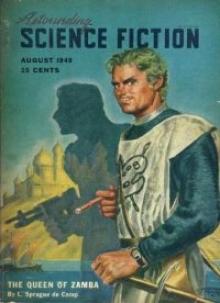 Letter to a Phoenix
Letter to a Phoenix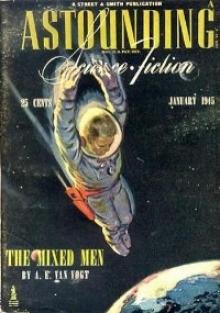 The Waveries
The Waveries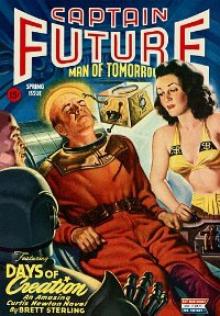 Nothing Sirius
Nothing Sirius The Deep End
The Deep End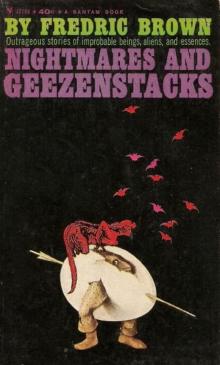 Nightmares & Geezenstacks
Nightmares & Geezenstacks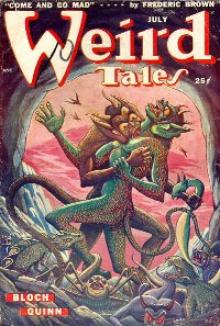 Come and Go Mad
Come and Go Mad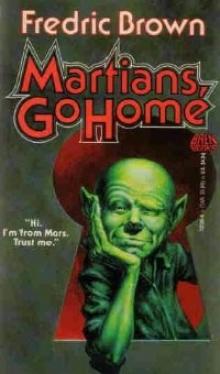 Martians, Go Home
Martians, Go Home